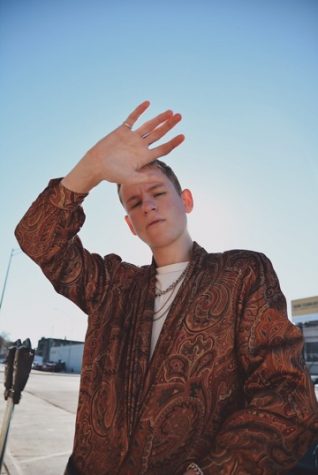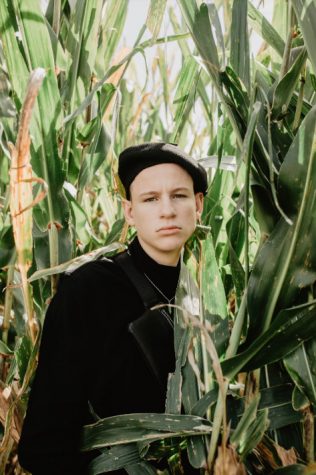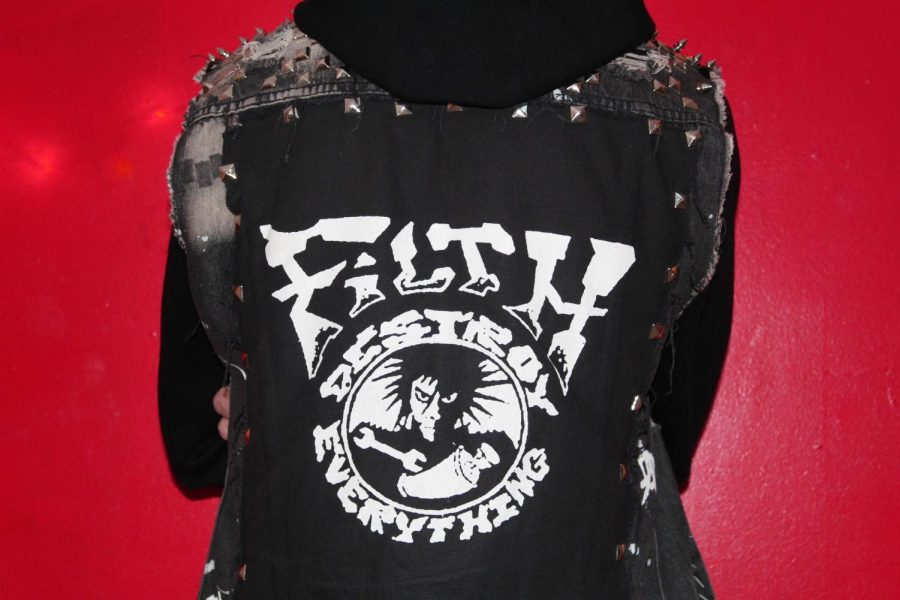Identity Clash: The conflict between two students’ fashion senses and society’s expectations
March 8, 2019
Meet Andrew Pottorff-McBride, a sophomore at Southeast who is known for his distinct sense of fashion and ever-changing hair style. Regularly, Pottorff-McBride dresses in his favorite black and gray studded vest, embellished with patches and often matched with a pair of red plaid pants and combat boots. Crafting these clothes from scratch, Pottorff-McBride truly owns his style.
“I’d describe myself as a person who likes to do his own thing, and be his own way. Someone who likes to stand out.”
Developing this punk-based fashion sense his entire life, Pottorff-McBride is on the fast path to establishing his own identity. However, this confident embrace of himself has not necessarily come easy.
It is no secret that as young people enter their teenage years, they become increasingly aware of their “selves,” that undeniable clash between the stereotypical, engrained ideas of who they are supposed to be and the reality of who they feel their truest selves to be. Pottorff-McBride has not been immune to this. Although he’s grown up with a supportive father who dresses in the same punk-garb as he does, the rest of society hasn’t felt the same individualistic pride he has.
“The majority of people don’t really understand why I dress like this. They think it’s kind of weird,” he said.
Most famously, he sported a flaming red mohawk at the beginning of the 2018 school year, which he says is a symbol of non-conformity. However, he shaved it early on in the year, and had many wondering why.
“I want to grow my hair long everywhere. It’s all the same length now, and and I want to keep it growing,” Pottorff-McBride said. “When my hair gets long, I’ll probably dye half of it red or black…it’ll be cool.”
Like any other teenage boy, Pottorff-McBride enjoys hanging out with friends, skateboarding and listening to music.
A large “Filth” patch on the back of one of Pottorff-McBride’s infamous jackets highlights his love of music. ”Filth” is a hardcore, crust punk band based in California. Along with Filth, Pottorff-McBride has found understanding of this culture and himself through a specific song by another band, “The Casualties.”
“A song called, ‘We Are All We Have’ is about the punk scene and people who dress like this or listen to this music,” Pottorff-McBride said. “It says that we are family, and when all else fails, we have each other. People don’t need to understand us because we don’t really care.”
Except for his dad, Pottorff-McBride has faced judgement from his family because of the chains and the black clothing, the loud music and the studded vests. “My whole family is Christian. A lot of them are super Catholic, including my cousins. I definitely get a lot of judgement from my family for being like this because they want me to dress conservatively, with a ‘normal’ haircut and ‘normal’ t-shirts,” Pottorff-McBride said. “I just try to ignore it. It’s even harder when it’s my family judging me. I guess it comes with the look, so I have to expect it.”
Along with his family, Pottorff-McBride has seen first-hand the judgement of his peers. “There’s definitely different groups of people who will hang out with me and who won’t hang out with me,” Pottorff-McBride said. “There are people who will film me on Snapchat, and send [it] to their friends like, ‘Oh my God, what is he wearing?’”
However, Pottorff-McBride also says he is friends with both “the rejects” and half of the football team. “I want them to know that I’m not scary or weird. I’m just a normal dude that dresses weird. People say that me and my friends look scary, and I guess we kind of do, but we’re nice people.”
Pottorff-McBride is friends with anyone who will be friends with him, and is open to the different lifestyles that others have. “I try to be polite to people, and if someone wants to show me a song by Trippie Redd or something, I’ll listen to it and I’ll get into it. I try to make them feel comfortable around me.”
He believes that the kids wWho aren’t as popular as the rest are the realest friends to have, not worried about the societal pressures of owning the name brands or how they come off to others.
“Everyone just does the same thing, because they want to be normal. No one is really normal,” Pottorff-McBride said, passionate about the issue of conformity. “People are scared to be themselves, because society expects everyone to be one way – be trendy and listen to the same music, do the same things. I try to be an individual, more than anything.”
Knox Downing is a senior at East High School who has also been known for his individual sense of fashion that stems from magazines and high class brands. This love of fashion has been coupled with a fervent passion for photography. Recently, his distinct hair colors have also become a part of him, too, black being a current staple piece. However, similarly to Pottorff-McBride, Downing’s journey to self expression has not come easily.
Downing first started developing his own style around sixth grade, but it didn’t pick up speed until his junior and now, senior, year of high school.
“I would say [my fashion sense developed] just from trial and error. It’s really funny… I’ve just gone through a lot of changes, over and over, developing and rethinking what I want to wear,” Downing said.
Growing up in a strict Christian home, Downing was taught that serving God should come before self-expression. According to what Downing was taught, there is a constant battle between sin, or the human “flesh,” and spiritual morality. The “flesh” is representative of human nature towards selfish practices, and he says that the church teaches that this should be oppressed.
According to Downing, assumptions about his sexuality have been made, especially when he was a student at a private Christian school during his freshman and sophomore year of high school. Rather than being automatically associated with a sexuality based on his clothing, Downing says he wants his dress to be seen as a reflection of his creativity and positivity and gets frustrated when he is reduced to a single identifier.
Downing is still a Christian and wants others to feel comfortable with who they are while they are a part of a religious community. He believes that no person should be judged as unholy or unworthy because of their style or sexuality. “I don’t think God would approve of us as Christians making homosexual people feel pushed away from the church because that’s the complete opposite of what the Bible teaches.”
While Downing is comfortable in his own skin, he has still felt the societal pressures from his close family and religious community.
“I think that this problem has recently come up in my life because I still go to church,” Downing said. “In the church, they teach that we shouldn’t make idols.”
However, Downing sees it in a completely different way. “If we’re looking at things from the perspective that God has a plan, and that everything in our life is there for a purpose, then God wouldn’t put my love of fashion in my life unless he wanted me to do something with it.”
Downing says that there is a way for both of these things – a unique sense of fashion and a belief in the importance of religion – to blend together, and he has appreciated those who have tried to test this.
“I guess, recently, I’ve just found respect for people who push outside the lines, and who aren’t afraid to take risks,” Downing said.
Taking risks is a prominent part of Downing’s development as a fashion designer and a person in general. When he first began to develop his own style, he focused primarily on minimalism, wearing maroon turtle necks and pairing white button downs with simple black pants. However, as he’s grown older, he’s learned an appreciation for color through vibrant jackets, chains and tropical, thrifted shirts found on the racks of local Goodwill stores.
“I’m starting to enjoy the extremes of fashion. I respect that a lot more, and for some reason, the church, as well as society, has put color and expressing yourself with color as being gay,” Downing said. “I think that’s totally ridiculous, because that shouldn’t be.”
Instead, Downing thinks that color is a beautiful part of our lives and should be enjoyed. “There is so much of it, and you can do so much with it. I think they should view it as giving glory to God,” Downing said. “If you’re using it in a way that is beautiful, it’s representing God, and it should ultimately lead back to Him.”
Even through the confident senior photos and frequent Instagram posts of his carefully put together fashion, Downing still struggles with the social pressures as well as the regular worries of a self-conscious teenager.
“I shouldn’t be worried about what people think of me, but I am, because I’m human,” Downing said.
However, like Pottorff-McBride, Downing has learned to cope with this over the years, partially through music, and is on his way to coming out of it.
“Personally, I’m not at the end of it, I still have my fair share of figuring out who I am. I don’t think that will ever end for anybody,” Downing said. “Use your love for things as a way to express yourself, and mold yourself. Mold those crafts, and become the best at it as you can.”











